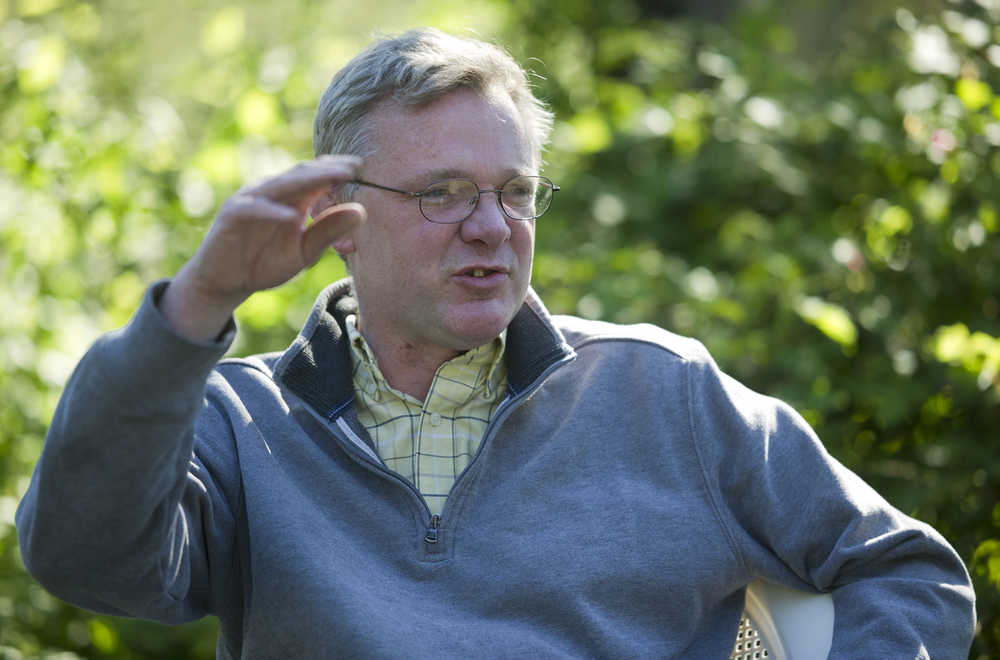At age 20, Wade Rathke was a community organizer fighting for the welfare rights of single mothers in Massachusetts. The following year, in 1970, he founded the Association of Community Organizations for Reform Now, better known as ACORN.
ACORN went on to become one of the biggest community-organizing groups in the U.S. that advocated for low- to moderate-income families on issues like voter registration, health care and affordable housing.
Now, at age 67, Rathke has taken on the task of leading the Juneau-based Mental Health Consumer Action Network, or MCAN, in its infancy and helping it get off the ground.
People experiencing mental health issues are “exactly the kind of group that needs to come together to look at how it interacts with programs designed for them,” Rathke said in a recent phone interview. “This is not a group that often has a voice, and it’s a voice that needs to be heard.”
So, how exactly did Rathke — a well-known figure on the national stage — get connected with a hyperlocal Juneau organization? Through Juneau resident Greg Fitch, founder and executive director of MCAN.
[Juneau man wants to start a mental health revolution through new nonprofit]
In the early 1990s, Fitch worked as a community organizer for ACORN in New Orleans. Rathke’s partner, Beth Butler, who also worked at ACORN, was Fitch’s mentor and the office Fitch worked in was next door to Rathke’s. The two became friends.
Fitch is also a mental health consumer. In the mid 2000s, he was diagnosed with bipolar disorder and PTSD. He wants MCAN to be the voice of people experiencing mental health issues and to have a say when mental health policy is made.
“When I came up with MCAN, the idea of MCAN was organizing the mental health consumer for social justice and change. So I basically took the ACORN concept and turned it into MCAN,” he said.
Fitch reached out to Rathke a few months ago, 25 years after the two worked together, and they started emailing and talking on the phone about MCAN.
“This is getting to the point where we can make a difference in people’s lives and I said, ‘Why don’t you just take over the board and become president?’ and he agreed,” Fitch said.
Rathke said Fitch was a good community organizer in New Orleans and he believes in his current efforts.
“He obviously knows what he’s doing, but I think what he’s trying to do is very rare. I only know of only two or three other efforts in the whole United States where people have tried to organize something similar. I think it’s a project with real promise and desperately meets a need,” Rathke said.
He added that it’s important for mental health consumers to speak for themselves and “be able to participate fully as citizens with a vested interest in their own lives and well-being. How can that not be anything other than good? Yet we don’t necessarily have people standing up and applauding this kind of effort.”
Rathke will initially serve as MCAN board president from afar. Once the group gets more established with resources, he plans to attend board meetings in person. He said the first orders of business will include forming bylaws and formally incorporating as a 501(c)3.
It’s not like Rathke isn’t already busy. After a series of controversies, Rathke left ACORN in 2008, a couple years before the organization ended in 2010, but he’s still the chief organizer of ACORN International and travels to countries like Honduras, Kenya and Peru. Based in New Orleans, Rathke also manages a couple of noncommercial radio stations and a local union; is putting the finishing touches on his third book, which has been in the works for 12 years; and runs a fair trade coffee shop. Not to mention all the other nonprofits and projects he has his hands in.
“I try to help out and keep as many balls in the air as I can before they drop and smash,” he said.
With Rathke as president, Fitch is in the process of filling in the other board positions, which will include a mental health consumer. MCAN is also working on funding. Beyond that, “our first goal is awareness,” Fitch said. “We cannot change things unless we educate people about what we go through. Awareness is our huge first key.”
Fitch wants MCAN to be a statewide organization and eventually go national. Until then, Fitch and others involved in MCAN have already been meeting with state lawmakers. The group hopes to get a state-sanctioned mental health awareness week in Alaska.
• Contact reporter Lisa Phu at 523-2246 or lisa.phu@juneauempire.com.
Read more news:
Juneau women inspired Sullivan’s statewide summit on conquering the opioid epidemic
Lost at the glacier, elderly woman spends night in woods, rescues self
Should UA’s three campuses combine into one? This report says no.

